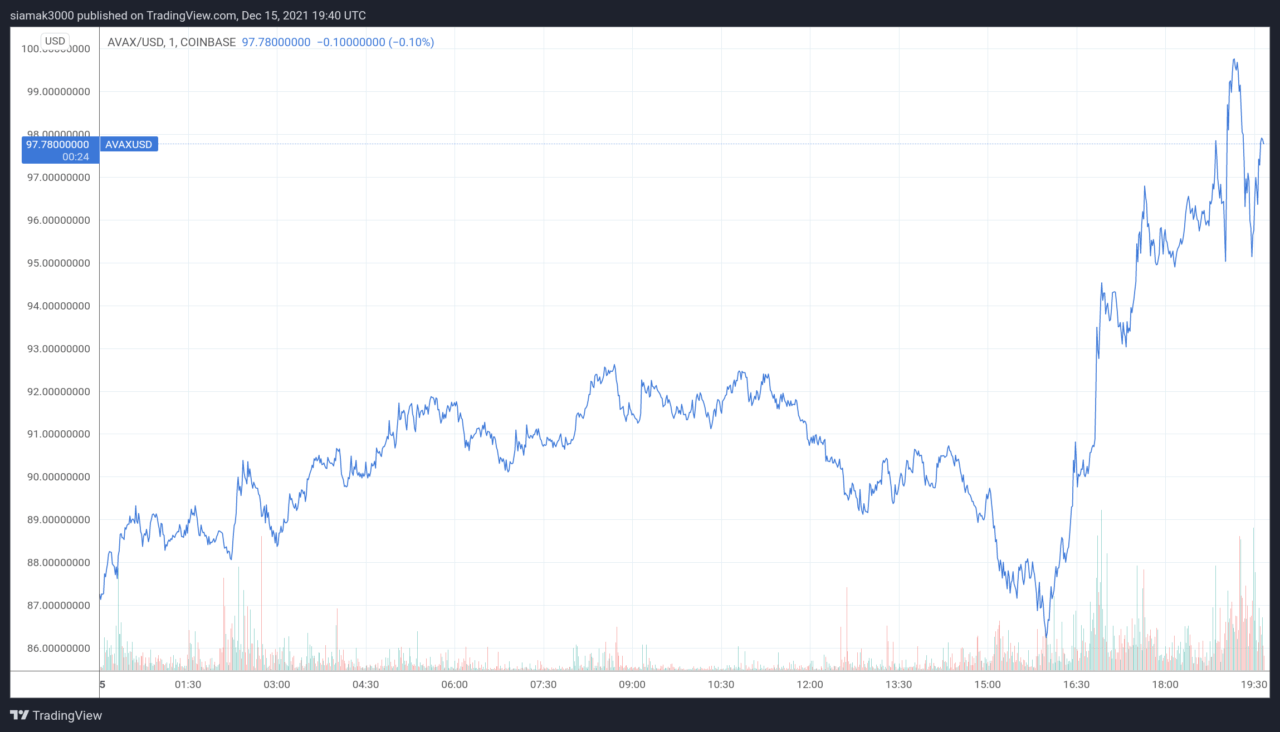According to a report published earlier today, Bank of America was recently singing the praises of smart contracts platform Avalanche in a research note for clients.
What is Avalanche ($AVAX)?
Below is a brief description of Avalanche from its developer documentation:
“Avalanche is an open-source platform for launching decentralized applications and enterprise blockchain deployments in one interoperable, highly scalable ecosystem. Avalanche is the first decentralized smart contracts platform built for the scale of global finance, with near-instant transaction finality. Ethereum developers can quickly build on Avalanche as Solidity works out-of-the-box.
“A key difference between Avalanche and other decentralized networks is the consensus protocol. Over time, people have come to a false understanding that blockchains have to be slow and not scalable. The Avalanche protocol employs a novel approach to consensus to achieve its strong safety guarantees, quick finality, and high-throughput without compromising decentralization.
“AVAX is the native token of Avalanche. It’s a hard-capped, scarce asset that is used to pay for fees, secure the platform through staking, and provide a basic unit of account between the multiple subnets created on Avalanche. 1 nAVAX is equal to 0.000000001 AVAX.“
Avalanche is being developed by Ava Labs, a blockchain startup founded in Brooklyn, New York in 2018 by Professor Emin Gün Sirer (CEO), who does computer science research at Cornell University, Kevin Sekniqi (COO), and Ted Yin (Chief Protocol Architect).
What Are Subnets in Avalanche?
Here is how Jay Kurahashi-Sofue, VP of Marketing at Ava Labs, explains it:
“A Subnet, or Subnetwork, is a dynamic set of validators working together to achieve consensus on the state of a set of blockchains. Each blockchain is validated by exactly one Subnet. A Subnet can validate arbitrarily many blockchains. A node may be a member of arbitrarily many Subnets.
“A Subnet manages its own membership and it may require that its constituent validators have certain properties. This is very useful and we explore its ramifications in more depth below.
“There is a special Subnet called the Primary Network, which validates Avalanche’s built-in blockchains. All members of all Subnets must also be a member of the Primary Network. In order to become a member of the Primary Network, one must stake some Avalanche tokens. The upshot of the preceding two points is that all validators of all blockchains must also validate Avalanche’s built-in blockchains and must have staked Avalanche tokens.”
What Bank of America Says About Avalanche
The Bank of America Corporation (aka “BofA”, aka “BoA”) is “an American multinational investment bank and financial services holding company headquartered in Charlotte, North Carolina.” It’s “the second largest banking institution in the United States, after JPMorgan Chase, and the eighth largest bank in the world.”
According to a CoinDesk report published today (December 15), BoA analysts led by analysts led by Global Crypto and Digital Asset Strategist Alkesh Shah wrote in a research note published on December 10:
“Subnets enable faster time-to finality (settlement) and lower costs than alternative blockchains.“
Apparently, the BoA research note also talked about the increase in Avalanche’s total value locked (TVL) and that Deloitte’s announcement on November 16 that it had “formed a strategic alliance with technology firm Ava Labs to enable a new disaster recovery platform that uses the Avalanche blockchain to help state and local governments easily demonstrate their eligibility for federal emergency funding” showed how large businesses could “leverage blockchain technology to increase efficiencies and reduce costs.”
$AVAX’s Price Action
According to data by TradingView, on crypto exchange Coinbase, at 07:09 p.m. UTC on December 15, the $AVAX price got as high as $99.7400, which is today’s intraday high and the highest the $AVAX porice has been since Decemebr 4.
Currently (i.e. as of 07:46 p.m. UTCon December 15), $AVAX is trading around $99.30, up 13.80% in the past 24-hour period.
Disclaimer
The views and opinions expressed by the author, or any people mentioned in this article, are for informational purposes only, and they do not constitute financial, investment, or other advice. Investing in or trading cryptoassets comes with a risk of financial loss.
Image Credit
Featured Image by “_anaposa_” via Pixabay










